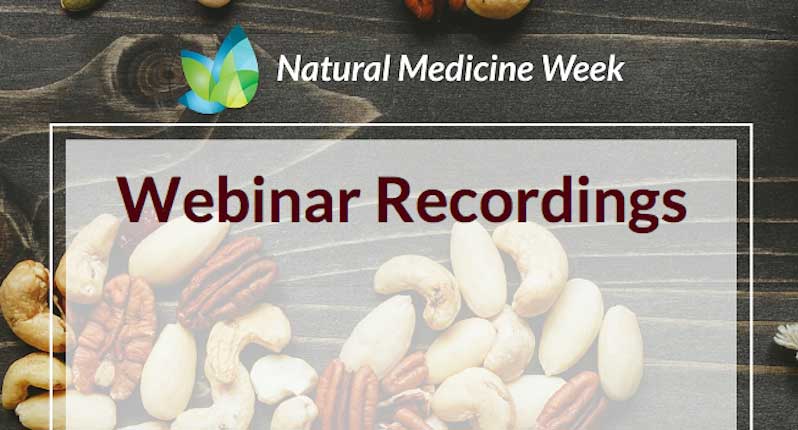During Natural Medicine Week 2020 our accredited practitioners across different types of Ingestive Therapies, Bodywork & Massage and Chinese Medicine came together to present online events in celebration of a natural approach to health and wellbeing.
If you missed any of these fabulous events, don’t worry – they also recorded their webinars, sessions and Q and A’s so you can watch them at your own leisure.
START WATCHING NOW – check out all the links below!
And a huge THANK YOU to all our practitioners for taking the time to support Natural Medicine Week in 2020 and sharing their therapies
TO WATCH – Click on the URLs below.
“From Invisible to Invincible” – The Natural Menopause Revolution
https://www.youtube.com/watch?v=ykm3-IOA-5w&t=24s
Presented by Jennifer Harrington, Clinical Director / Naturopath – Menopause Natural Solutions
www.menopausenaturalsolutions.com.au
The Brain- Gut- Hormone Connection
How stress influences Gut Health and Hormone Balance
https://www.youtube.com/watch?v=TJAh7LjB6kU&feature=youtu.be
Presented by Jacqui Watts – Healthful Wellness (www.healthful.net.au) & Danielle Elliott -Tummy Rescue (https://www.facebook.com/tummyrescue/)
Endometriosis? Why You Should Remove Gluten and How
https://www.youtube.com/watch?v=XjUEBZm_oB0&feature=youtu.be
Anne-Marijke Gerretsen, the Endometriosis Nutritionist – Eat Well Live Well
The Ketogenic Diet – Is It Right For You?
https://www.youtube.com/watch?v=C_Ek72TV4-U&feature=youtu.be
Sonya Reynolds, Nutritionist & Life Coach, Studio-You
https://www.studio-you.com.au/
Homeopathy for sleep disorders
https://www.youtube.com/watch?v=OPZgJA1ZL5w
Christina Boyd, Homeopath, Holistic Kinesiologist, Switch on Health
https://www.switchonhealth.com.au
Natural therapies for Hormonal Skin Conditions
https://www.youtube.com/watch?v=YADvMQXdBe4
Deanne Apostolou, Medical Herbalist & Iridologist, Switch on Health
https://www.switchonhealth.com.au
Natural Remedies for Pain
https://www.youtube.com/watch?v=KqF_Az3kqYU
Sally Maizey, Naturopath & Homeopath, Switch on Health
https://www.switchonhealth.com.au
Natural Medicine for Low Thyroid Function
https://www.youtube.com/watch?v=sw06Fx8agQ8
Carol Hannington, Naturopath, Switch on Health
https://www.switchonhealth.com.au
Switch on Health is the only ATMS accredited college to offer non-Bachelor qualifications in Nutrition, Herbal Medicine, and Naturopathy, and the only college in Australia offering an accredited course in Homeopathy. You can study from home in your own time at your own pace. The courses are fully tutor supported and flexible payment plans are available. Sample course content can be viewed for free at our learning platform: https://switchonhealth.learnworlds.com/start
The Gut-Brain Connection Webinar
https://us02web.zoom.us/rec/share/2f1yL7POykhIH7fz6G72d4wlEo_OX6a8hHMe_PMPyh0BxjbW3SvUT-LDQNCQco0m
Rachel Aldridge, Naturopath – In Natures Hands
http://www.innatureshands.com.au
All Disease Begins in the Stomach
https://www.medicinetraditions.com/natural-medicine-week.html
Adam Tate, Practitioner of Traditional Medicine, Medicine Traditions
https://www.medicinetraditions.com/
Cuppa with a Kinesiologist
Marney Perna – www.kinique.com
Anika Brizuela – www.branchoutempoweredhealth.com
Madonna Guy – www.newleafnaturaltherapies.com.au
Molly Brumm – www.consciousheartkinesiology.com.au
Vanessa Worn – www.facebook.com/Full-Potential-Kinesiology-107332970999197
Zoie Andrews – www.mybestselfwellness.com.au
Benefits of Kinesiology
https://www.youtube.com/watch?v=iOskfN5FFeA&t=11s
KinesiAlice – Kinesiology, Mind Body Medicine, Integrative Therapy
https://www.kinesialice.com.au/
Kinesiology and Anxiety
https://www.youtube.com/watch?v=UQL9SCSkdsQ
KinesiAlice – Kinesiology, Mind Body Medicine, Integrative Therapy
https://www.kinesialice.com.au/
Kinesiology and Depression
https://www.youtube.com/watch?v=rDWOTK0YwZc
KinesiAlice – Kinesiology, Mind Body Medicine, Integrative Therapy
https://www.kinesialice.com.au/
Kinesiology and Sleep
https://www.youtube.com/watch?v=3vR4rAHyn8o&t=7s
KinesiAlice – Kinesiology, Mind Body Medicine, Integrative Therapy
https://www.kinesialice.com.au/
Kinesiology and Kids
https://www.youtube.com/watch?v=Z3OruKmKqZM&t=1s
KinesiAlice – Kinesiology, Mind Body Medicine, Integrative Therapy
https://www.kinesialice.com.au/
7 Secrets to Success – how to beat burnout, stress & overwhelm for good!
https://kajabi.awakendivinefeminine.com/registration-page-1
Kristie Hayden
https://www.facebook.com/DreamWeaverCoaching/




